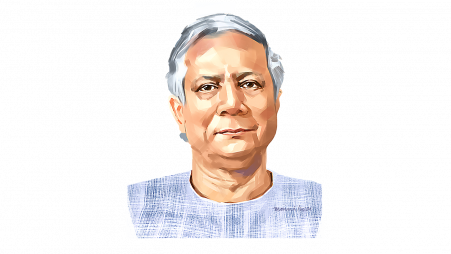It's the birth of a new Bangladesh: Yunus after signing July Charter
Mentioning that Bangladesh never explored potential of Bay of Bengal, the chief adviser stressed the need for deep-sea port.
Highlights
- CA pays tribute to martyrs of the July Uprising
- Stresses full utilisation of Bay of Bengal resources
- Proposes a deep-sea port for direct international shipping
- Ports to boost regional economy with Nepal, Bhutan, and the 'Seven Sisters'
- Calls for political unity for a fair national election
- Polls to be transparent, leaving no room for external interference, he says
Chief Adviser Muhammad Yunus today (17 October) described the signing of the July National Charter as the birth of a "New Bangladesh."
Speaking after the signing of the charter on the South Plaza of the National Parliament, the chief adviser remembered the martyred of the July Uprising.
"The nation is indebted to the July fighters," he said.

Harnessing Bay of Bengal: Deep-sea ports and regional economy
Mentioning that Bangladesh never explored the full potential of Bay of Bengal, the chief adviser stressed the need for a deep-sea port.
"The Bay of Bengal is an integral part of our country. It is rich in resources, and we aim to ensure their full utilisation. We want to move forward and avoid unnecessary debates. This July Charter will put an end to all such disputes," he said.

"We can transform the entire country by harnessing the resources of the Bay of Bengal and the coastal regions," he added.
He further noted that a deep-sea port in Bangladesh would allow ships from other countries to dock directly.
"They won't need to offload shipments at other ports like Singapore; they can bring them straight to our shores. This also allows shipments for other countries to be delivered through us. It's a great opportunity."
Yunus went on to say, "By upgrading ports at Cox's Bazar, Matarbari, and Maheshkhali, we can transform the entire region into a 'New Singapore'. These ports can foster a regional economy and strengthen economic ties with Nepal, Bhutan, and the 'Seven Sisters,' benefiting all parties."
Elections with unity: No room for external questions
"The tune we played today — the tune of unity — will guide us to the February elections. This unity must prevail," said the chief adviser.
He called upon political parties to sit together and formulate a policy to hold a festive, historical election.
Yunus stated that the signing of the charter marks the moment to prioritise national elections.

"We are capable of holding a fair election, there is no need for external interference. It must set an example for both the nation and the world. Today's signing ceremony reflects our capabilities, and through our actions, we must demonstrate that we can achieve this through unity."
"We will hold elections in a manner that no one from outside can raise questions," he added.
The signing of July Charter
Two representatives from each political parties signed the charter followed by the members of the National Consensus Commission including Ali Riaz.
Earlier, the chief adviser arrived at the venue around 4:30pm

Senior leaders from most political parties, including the BNP, Jamaat-e-Islami, Gana Sanghati Andolan, Gono Odhikar Parishad, AB Party, Liberal Democratic Party, NDM, BJP, and Khelafat Majlis joined the event.

Ambassadors and high commissioners from various countries, including several European nations, along with diplomats, civil society representatives, members of the government's advisory council, and members of the Consensus Commission are also attending the ceremony.
More than a dozen BNP leaders, led by the party's Secretary General Mirza Fakhrul Islam Alamgir, are participating, while Jamaat-e-Islami Secretary General Mia Golam Parwar is leading the party's delegation at the event.
However, leaders from the National Citizen Party (NCP), Communist Party of Bangladesh (CPB), the Bangladesh Samajtantrik Dal (Basad), the Bangladesher Samajtantrik Dal (Marxist), and the Bangladesh Jatiya Samajtantrik Dal (Jasad) refrained from joining the event.
Members of the government's advisory council and distinguished figures from various professions were also present.
Earlier in the day, clashes ensued on Manik Mia Avenue as police baton-charged individuals who gathered on the parliament premises under the banner of "July Fighters" to press home their three demands.
Police also hurled multiple rounds of sound grenades and tear-gas shells to disperse the crowd. Several people were injured in the clashes.
The protestors vandalised police vehicles, including a car and a bus. They also set fire to the temporary reception room, temporary control room and furniture built in front of the MP building on Manik Mia Avenue for today's July Charter Signing Ceremony.
Yesterday, Chief Adviser Muhammad Yunus called on all television channels and online media outlets to broadcast the July National Charter signing ceremony live, and urged all Bangladeshis to join in the historic moment for the nation.
"To every Bangladeshi — wherever you are, at home or on the move, in your shops, factories, fields, or playgrounds — tune in and be part of this historic moment! Despite our political, religious, or ethnic differences, we stand together as ONE UNITED NATION," he said.
The July National Charter outlines areas of reform on which the country's political parties are expected to reach a consensus in principle. Drafted by the Consensus Commission, the charter is intended to serve as a framework for state reform following last year's July Uprising.



 Keep updated, follow The Business Standard's Google news channel
Keep updated, follow The Business Standard's Google news channel



















